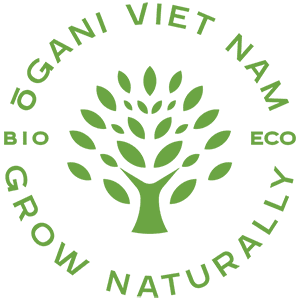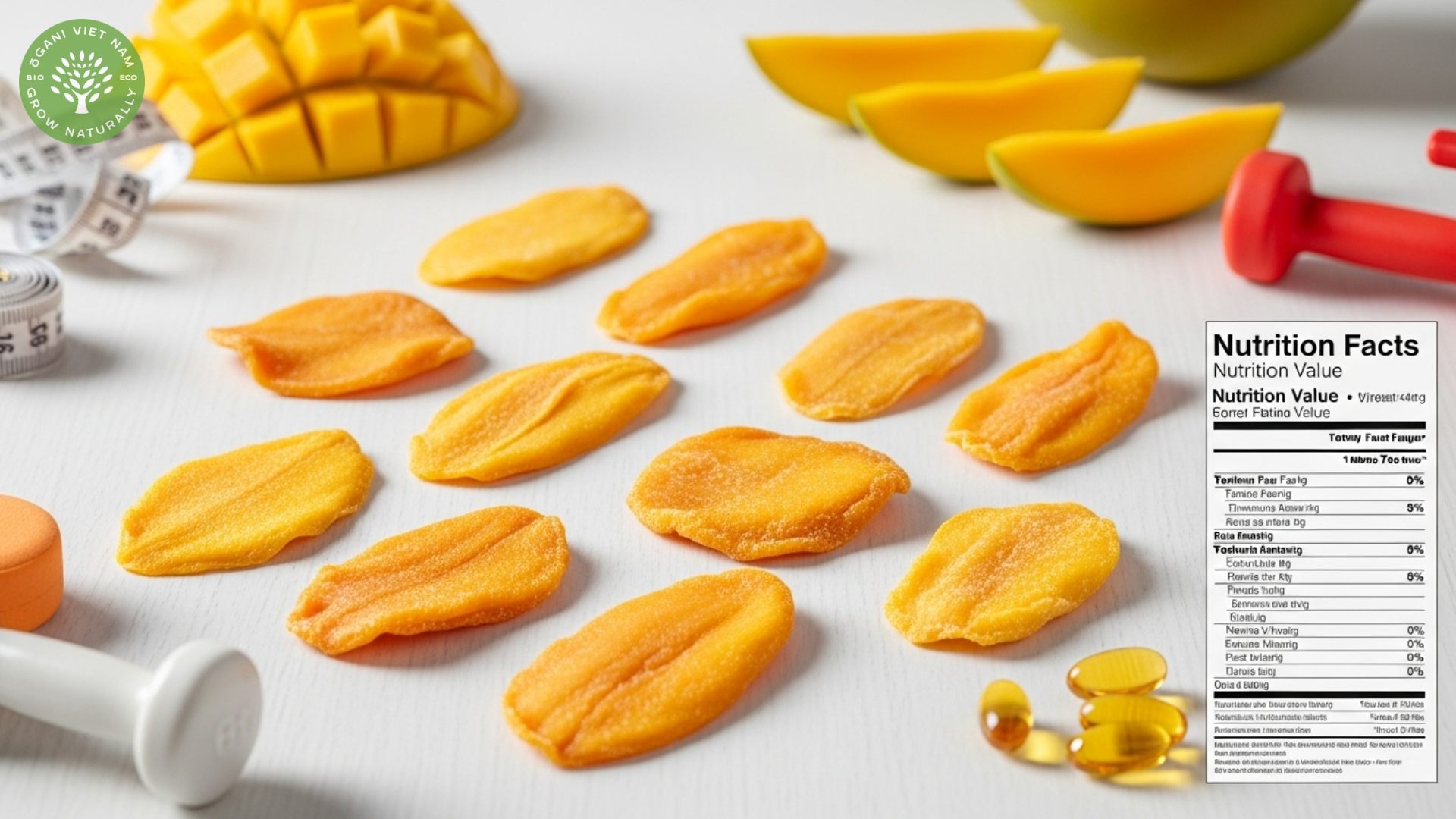Dried mango nutritional value offers a concentrated source of essential vitamins and minerals, delivering approximately 314 calories per 100g serving with significant amounts of vitamin A, vitamin C, and dietary fiber. At Ogani VN, we understand that knowing the complete nutritional profile helps you make informed decisions about incorporating this tropical superfood into your daily diet.
Complete dried mango nutritional value breakdown
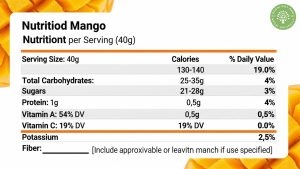
Dried mangoes pack an impressive nutritional punch in every serving. A standard 40-gram portion contains approximately 130-140 calories, making it a calorie-dense snack that provides sustained energy. The dehydration process concentrates the fruit’s natural nutrients, creating a powerhouse of vitamins and minerals.
The dried mango nutritional value shines particularly bright in its vitamin content. Each serving delivers about 19% of your daily vitamin C requirement, supporting immune function and collagen synthesis. Vitamin A content reaches exceptional levels, with some varieties providing up to 54% of the recommended daily intake, crucial for maintaining healthy vision and skin.
Key minerals include potassium for heart health and muscle function, magnesium for bone strength, and iron for oxygen transport throughout your body. The fiber content, while reduced from fresh mango due to processing, still provides digestive benefits and helps regulate blood sugar levels.
Dried mango nutritional value: calories and macronutrients
Understanding the calorie density of dried mango helps you incorporate it wisely into your meal planning. A typical serving contains 25-35 grams of carbohydrates, with natural sugars comprising the majority. This high sugar content, ranging from 21-28 grams per serving, provides quick energy but requires mindful consumption for those monitoring blood glucose levels.
Protein content remains modest at approximately 1 gram per serving, while fat content stays minimal at less than 0.5 grams. This macronutrient profile makes dried mango an excellent pre-workout snack or afternoon energy booster.
The concentrated nature means you’ll consume more calories per gram compared to fresh mango. While fresh mango contains about 60 calories per 100g, dried varieties can contain up to five times more calories in the same weight, making portion control essential for weight management goals.
Health benefits beyond dried mango nutritional value
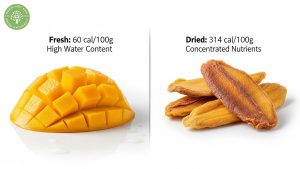
Beyond basic nutrition, dried mango contains powerful bioactive compounds that contribute to overall wellness. Mangiferin, a unique xanthone compound found predominantly in mangoes, exhibits antioxidant and anti-inflammatory properties that may support cardiovascular health and immune function.
Carotenoids, including beta-carotene and lutein, give dried mango its vibrant color while protecting your cells from oxidative stress. These compounds support eye health and may reduce the risk of age-related macular degeneration.
Antioxidant properties
The concentration of antioxidants in dried mango rivals many other dried fruits. Polyphenols work synergistically with vitamin C and vitamin E to neutralize free radicals and reduce inflammation throughout your body.
Digestive health support
Despite reduced fiber content compared to fresh fruit, dried mango still provides prebiotic benefits that support healthy gut bacteria. The natural enzymes present, though diminished through processing, can aid in protein digestion when consumed as part of balanced meals.
Dried mango nutritional value vs fresh mango
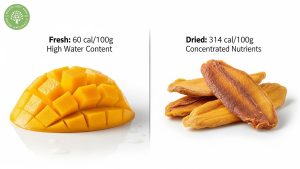
While both forms offer nutritional benefits, the dried mango nutritional value differs significantly from its fresh counterpart. Fresh mango contains higher water content, making it less calorie-dense and more hydrating. A 100-gram serving of fresh mango provides only 60 calories compared to 314 calories in dried form.
Vitamin C levels decrease during the drying process, with fresh mango typically containing 36mg per 100g compared to 12-15mg in dried varieties. However, vitamin A content often increases due to concentration, making dried mango a superior source of this fat-soluble vitamin.
The sugar concentration dramatically increases in dried mango, with levels reaching 66-75 grams per 100g compared to 13-15 grams in fresh fruit. This makes portion control crucial when choosing dried varieties, especially for individuals with diabetes or those following low-sugar diets.
Maximizing dried mango nutritional value through quality selection
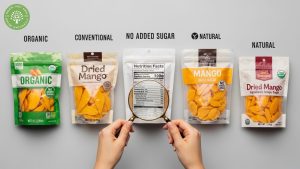
Not all dried mangoes offer equal nutritional value. At Ogani VN, we recommend selecting products with minimal added ingredients to maximize health benefits. Look for varieties that contain only mango without added sugars, sulfur dioxide, or artificial preservatives.
Organic options often provide superior nutritional profiles and reduce exposure to pesticide residues. The drying method also impacts nutrient retention – sun-dried or low-temperature dehydrated mangoes typically preserve more vitamins compared to those processed at high temperatures.
Reading nutrition labels carefully helps you understand exactly what you’re consuming. Some commercial varieties add sugar, increasing the already high natural sugar content and reducing the dried mango nutritional value per calorie consumed.
Frequently Asked Questions
How much dried mango should I eat daily? A recommended serving size is 30-40 grams (about 6-8 pieces), providing essential nutrients without excessive sugar intake. This portion delivers approximately 130-140 calories and fits well into most balanced diets.
Is dried mango suitable for diabetics? Due to its high natural sugar content, diabetics should consume dried mango in moderation and monitor blood glucose response. Pairing with protein or healthy fats can help slow sugar absorption.
Does dried mango lose nutrients during processing? Some water-soluble vitamins like vitamin C decrease during drying, while fat-soluble vitamins and minerals become more concentrated. The overall nutritional value remains significant despite some losses.
Can dried mango replace fresh fruit in my diet? While nutritious, dried mango shouldn’t completely replace fresh fruits due to higher calorie density and reduced water content. Use it as a complement to, not replacement for, fresh produce.
Making the most of dried mango nutritional value
The dried mango nutritional value makes it an excellent addition to a balanced diet when consumed mindfully. Its concentrated vitamins, minerals, and antioxidants provide substantial health benefits, while its natural sweetness satisfies cravings for processed snacks. At Ogani VN, we’re committed to helping you access premium dried mango products that maximize nutritional benefits.
Ready to experience the exceptional taste and nutrition of premium dried mango? Explore our carefully selected collection of organic dried mangoes and discover how this tropical superfood can enhance your healthy lifestyle. Contact our nutrition experts today for personalized recommendations tailored to your dietary goals.
Read more:
- Dried Mango Nutrition Facts: Complete Guide To Calories, Benefits & Health Impact
- Best Dried Mango No Sugar Added: Premium Quality Guide
- Calories In Dried Mango No Sugar Added: Complete Nutrition Guide
- Dried Mango Nutritional Value: Complete Health Guide
